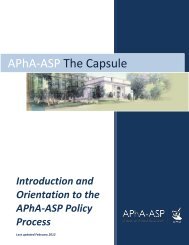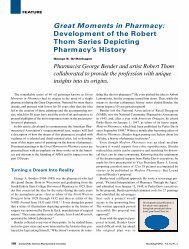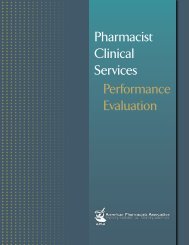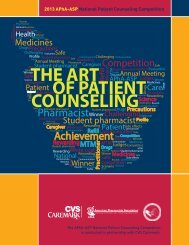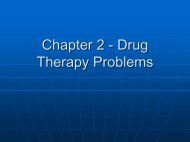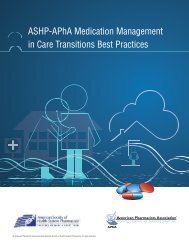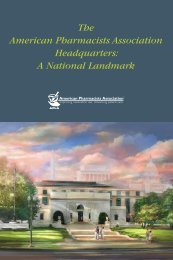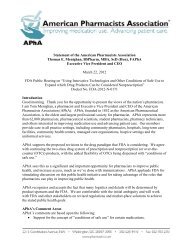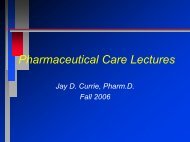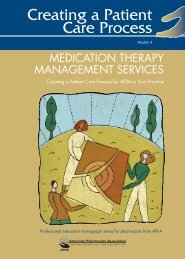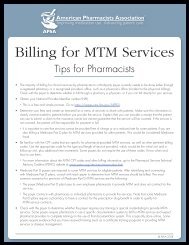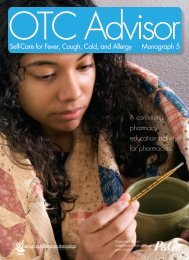Open-Ended Questions. Table 8 compares open andclosed questions. Note how the open-ended questionsare likely to encourage the patient to provide moreinformation than the closed-ended questions, which canbe answered with a “yes” or “no” response. For example,instead of asking, “Do you have any questions about yourmedications?” student pharmacists can be coached to ask,“What questions do you have about your medications?”Student pharmacists should be trained to use suchquestions during both routine patient counseling and moreadvanced patient care services.Active Listening. <strong>Pharmacist</strong>s are more likely to obtaincomprehensive information from the patient and convey asense of empathy when they listen well. Active listeningrequires student pharmacists to pay careful attention towhat patients have to say. Student pharmacists shouldbe trained to allow patients to completely verbalize theirthoughts, rather than assuming the patient’s response, orinterrupting them when they pause.Reflecting Statements. Responding to patients’concerns by rephrasing what they just said is anothermechanism that helps ensure that the information wascorrectly understood, and allows the patient to elaboratewhen necessary. For example, if the patient says, “I’m justtired of taking all these drugs for my diabetes because theydon’t seem to fix anything,” the pharmacist could respond bysaying, “It sounds like managing diabetes, which is a chroniccondition, is frustrating for you.” This reflecting statementallows the patient an opportunity to expand on specificconcerns. Appropriate levels of courtesy, assertiveness, andsupport of the patient’s behaviors should be explored.Empathy. A genuine attitude of caring and abilityto convey empathy is important for any health careprofessional. Empathy is the ability to understand andbe sensitive to another’s thoughts and feelings, withoutexperiencing the person’s position. <strong>Preceptor</strong>s should workwith student pharmacists to help cultivate an attitude ofempathy and explore strategies for communicating thisattitude to patients.Nonverbal Communication. There are many differentaspects of nonverbal communication, including tone ofvoice, facial expressions, and body language, such as headposition, use of the hands, placement of arms and legs, andgestures. Appropriate eye contact is also important.Many student pharmacists have limited experiencetalking to patients as a health care provider and may benervous or shy about taking on this role. Encourage studentpharmacists to use language, postures, and expressionsthat convey attentiveness and empathy. One methodthat allows student pharmacists to see how they mightappear to patients is to practice communication skills byinterviewing themselves in the mirror. <strong>Preceptor</strong>s alsocan involve student pharmacists in role-playing exercisesto support development of communication skills. Askstudent pharmacists to pretend that you are a patient andto explain the appropriate use of a medication to you, andanticipate what questions you as the patient might have.<strong>Preceptor</strong>s should strive to provide ample feedbackto student pharmacists on their performance ofcommunication skills. <strong>Preceptor</strong>s should help studentTABLE 8. Open vs Closed QuestionsClosed-Ended QuestionOpen-Ended QuestionDid you have any side effects?What side effects did you have?Do you remember to take your medication every day?About how many times do you remember to take yourmedication in a 2-week period?Do you take any dietary supplements?What dietary supplements do you take?Do you have any other medical problems?What other medical problems do you have?Do you feel comfortable with your medication schedule?How do you feel about your medication schedule?Have you tried anything else?What else have you tried?Did I answer your question?What other information may I help you with?18 APhA and NACDS Foundation
pharmacists evaluate what worked well, and offersuggestions that the student can use to improve after eachpatient interaction.Teaching Student <strong>Pharmacist</strong>s toCommunicate With the Health Care TeamGood communication skills for interacting withother health care providers must be modeled and taught.<strong>Community</strong> pharmacy–based patient care activities requirefrequent written and verbal interaction with other health careproviders. To address these skills, review your pharmacy’sprocesses and procedures for contacting and interactingwith prescribers. Provide student pharmacists with tips andstrategies for phrasing recommendations and concerns toprescribers, and for tailoring the message to differences inindividual prescriber communication patterns.In addition, review your procedures for when andhow patients should be referred for further evaluation andtreatment, along with any networks of providers that youusually use for referrals. Describe your state’s or pharmacy’srequirements and procedures for documenting interactionswith other health care providers, and help facilitate thestudent pharmacist’s comfort in using this documentation.Many interactions with other health care providerswill involve medication queries or changes. Prescribersmay not be able to devote the time to review the changewith the student pharmacist first, followed by a seconddiscussion with you. Therefore, you may need to developother strategies, such as role plays that simulate theseinteractions, for student pharmacists who are not ready tomanage such interactions. With the prescriber’s permission,you could arrange to have the student pharmacist listenin during phone calls. This activity will allow studentpharmacists to be involved with the entire process, and itshould be followed by reflection and discussion.Customer Service IssuesPrepare your student pharmacist to addresscustomer service issues during either the orientation orintroduction to patient care services, and revisit theseissues as appropriate throughout the rotation. Even withexcellent communication skills, it is inevitable thatstudent pharmacists will someday encounter angry orupset patients, and they need to be prepared to handlethese situations. In addition, student pharmacists shouldbe trained how to respond if an error has been made indispensing a medication.The appropriate way to respond to a patient dependson the source of the problem. A patient with worseningdiabetes may simply need an empathetic ear to defuse anegative attitude, whereas patients who are concernedabout the high cost of their medications may requiredirection to resources that can assist with the cost.A discussion of conflict resolution skills can helpprepare student pharmacists to address such customerservice situations (Table 4). In addition, attention tothe development of communication skills may help thestudent pharmacist avoid some conflicts. Keep in mind thatalthough student pharmacists may be instructed to deferdifficult issues to the preceptor or manager during rotations,they should be prepared to manage difficult situationswhen they enter practice. Therefore, development ofconflict management skills will be important as studentsprogress through their experiential learning.Pharmacy Management SkillsWhether or not it is an explicit objective of therotation, preceptors should introduce student pharmaciststo concepts of pharmacy management and provide themwith an understanding of how a community pharmacyoperates. ACPE defines aspects of practice managementwhere student pharmacists should develop competency(Table 9). 2 Elements of site management can be exploredduring orientation, at dedicated discussion times, and/oras they arise during the rotation. The student pharmacistshould understand that site management will be anessential part of the operations of any type of pharmacypractice setting.A general understanding of how the practice siteoperates is fundamental for student pharmacists to beprepared to manage site operations once they becomepracticing pharmacists. The depth of education in this areawill depend on the goals of the rotation, the experienceof the student pharmacist, and their desired career goals.Pharmacy management training skills expand students’TABLE 9. Aspects of Practice Management■ Management principles (e.g., planning, organizing,directing, and controlling resources)■ Application of management principles to variouspractice settings■ Management of staff■ Tools, including informatics, needed to assess andaddress change, increase competitiveness, improvequality, and optimize patient care■ Management of medication use safety systems■ Strategies to improve continuity of patient care■ Basic principles of marketing and accounting■ Infection control■ Project management■ Third-party administration and managed care systems■ Health care improvement mechanismsSource: Reference 2.The <strong>Community</strong> <strong>Pharmacist</strong> <strong>Preceptor</strong> <strong>Education</strong> <strong>Program</strong> 19



